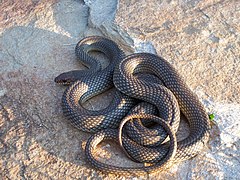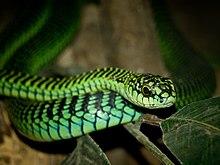Colubrid
A colubrid (from Latin coluber, snake) is a snake that is a member of the Colubridae family. Colubridae is the largest snake family, and includes about two-thirds of all known living snake species. However, colubrids are certainly not a natural group, and many are more closely related to other groups, such as elapids, than to each other. This family has classically been a dumping ground for snakes that do not fit anywhere else. There is on-going mitochondrial DNA research which will sort out the familial relations within this group.[1][2]
| Colubrids | |
|---|---|

| |
| Caspian whipsnake Coluber (Dolichophis) caspius | |
| Scientific classification | |
| Kingdom: | |
| Subphylum: | |
| Class: | |
| Subclass: | |
| Superorder: | |
| Order: | |
| Infraorder: | |
| Family: | Colubridae
|

A colubrid's body is almost completely covered in scales. Most colubrids are not venomous and are normally harmless. A few groups, such as genus Boiga, can produce medically significant bites. In addition, the Boomslang and African twig snake have both caused human fatalities. The venom-injecting fangs associated with venomous colubrids are almost always in the back of the mouth, in contrast to vipers and elapids.
Selected species
changeReferences
change- ↑ Lawson R. et al 2005. Phylogeny of the Colubroidea (Serpentes): new evidence from mitochondrial and nuclear genes. Molecular Phylogenetics and Evolution 37: 581–601. [1]
- ↑ Fry, B.G. et al 2009. Evolution and diversification of the Toxicofera reptile venom system. Journal of Proteomics 72: 127–136. [2]